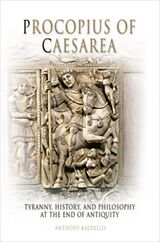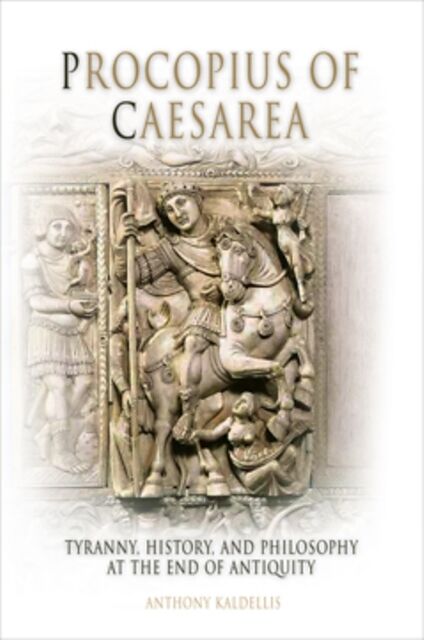Procopius of Caesarea
Einband:
Fester Einband
EAN:
9780812237870
Untertitel:
Tyranny, History, and Philosophy at the End of Antiquity
Genre:
Geschichte
Autor:
Anthony Kaldellis
Herausgeber:
Renewed Spirit Publishing
Anzahl Seiten:
320
Erscheinungsdatum:
25.03.2004
ISBN:
978-0-8122-3787-0
Informationen zum Autor Anthony Kaldellis teaches Greek and Latin at The Ohio State University. He has translated Genesios's On the Reigns of the Emperors and has written books on Psellos's Chronographia and (in Greek) on the Roman and Byzantine history of Lesbos. Klappentext "Important, well argued."--Choice Justinian governed the Roman empire for more than thirty-eight years, and the events of his reign were recorded by Procopius of Caesarea, secretary of the general Belisarius. Yet, significantly, Procopius composed a history, a panegyric, as well as a satire of his own times. Anthony Kaldellis here offers a new interpretation of these writings of Procopius, situating him as a major source for the sixth century and one of the great historians of antiquity and Byzantium. Breaking from the scholarly tradition that views classicism as an affected imitation that distorted history, Kaldellis argues that Procopius was a careful student of the classics who displayed remarkable literary skill in adapting his models to the purposes of his own narratives. Classicism was a matter of structure and meaning, not just vocabulary. Through allusions Procopius revealed truths that could not be spoken openly; through anecdotes he exposed the broad themes that governed the history of his age. Elucidating the political thought of Procopius in light of classical historiography and political theory, Kaldellis argues that he owed little to Christianity, finding instead that he rejected the belief in providence and asserted the supremacy of chance. By deliberately alluding to Plato's discussions of tyranny, Procopius developed an artful strategy of intertextuality that enabled him to comment on contemporary individuals and events. Kaldellis also uncovers links between Procopius and the philosophical dissidents of the reign of Justinian. This dimension of his writing implies that his work is worthy of esteem not only for the accuracy of its reporting but also for its cultural polemic, political dissidence, and philosophical sophistication. Procopius of Caesarea has wide implications for the way we should read ancient historians. Its conclusions also suggest that the world of Justinian was far from monolithically Christian. Major writers of that time believed that classical texts were still the best guides for understanding history, even in the rapidly changing world of late antiquity. Anthony Kaldellis teaches Greek and Latin at The Ohio State University. He has translated Genesios's On the Reigns of the Emperors and has written books on Psellos's Chronographia and (in Greek) on the Roman and Byzantine history of Lesbos. Zusammenfassung A major new study of the last great historian of classical antiquity. Inhaltsverzeichnis Acknowledgments Introduction 1. Classicism and Its Discontents The Preface of the Wars A Typology of Classicism A Distorting Mirror? Interdicting the Secret History and the Buildings 2. Tales Not Unworthy of Trust: Anecdotes and the Persian War Arcadius and Isdigerdes (1.2.1-10) Anatolius and Vararanes (1.2.11-15) Ephthalites, Persians, and Romans (1.3.1-1.4.13) The Pearl of Perozes (1.4.14-31) The Tyranny of Cavades (1.5-7) The "History of the Armenians" (1.5.7-40) 3. The Secret History of Philosophy The Sequence of Regimes Ends in Tyranny Tyranny and the Politics of Philosophy Plato's Nightmare Platonic Texts, Platonic Readers 4. The Representation of Tyranny Chosroes and Justinian, "Emperors of East and West" "Vanity of Vanities": Despotism and Imperial Ceremony "The Rule of Women" and the Plan of Secret History 1-5 Laws, Demons, and the Limits of Classicism in the Secret History Alternatives and Solutions 5. God and Tyche in the Wars Christianity? Coping with Tyche The Supremacy of T...
Klappentext
"Important, well argued."--Choice
Justinian governed the Roman empire for more than thirty-eight years, and the events of his reign were recorded by Procopius of Caesarea, secretary of the general Belisarius. Yet, significantly, Procopius composed a history, a panegyric, as well as a satire of his own times. Anthony Kaldellis here offers a new interpretation of these writings of Procopius, situating him as a major source for the sixth century and one of the great historians of antiquity and Byzantium.
Breaking from the scholarly tradition that views classicism as an affected imitation that distorted history, Kaldellis argues that Procopius was a careful student of the classics who displayed remarkable literary skill in adapting his models to the purposes of his own narratives. Classicism was a matter of structure and meaning, not just vocabulary. Through allusions Procopius revealed truths that could not be spoken openly; through anecdotes he exposed the broad themes that governed the history of his age.
Elucidating the political thought of Procopius in light of classical historiography and political theory, Kaldellis argues that he owed little to Christianity, finding instead that he rejected the belief in providence and asserted the supremacy of chance. By deliberately alluding to Plato's discussions of tyranny, Procopius developed an artful strategy of intertextuality that enabled him to comment on contemporary individuals and events. Kaldellis also uncovers links between Procopius and the philosophical dissidents of the reign of Justinian. This dimension of his writing implies that his work is worthy of esteem not only for the accuracy of its reporting but also for its cultural polemic, political dissidence, and philosophical sophistication.
Procopius of Caesarea has wide implications for the way we should read ancient historians. Its conclusions also suggest that the world of Justinian was far from monolithically Christian. Major writers of that time believed that classical texts were still the best guides for understanding history, even in the rapidly changing world of late antiquity.
Anthony Kaldellis teaches Greek and Latin at The Ohio State University. He has translated Genesios's On the Reigns of the Emperors and has written books on Psellos's Chronographia and (in Greek) on the Roman and Byzantine history of Lesbos.
Zusammenfassung
A major new study of the last great historian of classical antiquity.
Inhalt
Acknowledgments
Introduction
1. Classicism and Its Discontents
—The Preface of the Wars
—A Typology of Classicism
—A Distorting Mirror?
—Interdicting the Secret History and the Buildings
2. Tales Not Unworthy of Trust: Anecdotes and the Persian War
—Arcadius and Isdigerdes (1.2.1-10)
—Anatolius and Vararanes (1.2.11-15)
—Ephthalites, Persians, and Romans (1.3.1-1.4.13)
—The Pearl of Perozes (1.4.14-31)
—The Tyranny of Cavades (1.5-7)
—The "History of the Armenians" (1.5.7-40)
3. The Secret History of Philosophy
—The Sequence of Regimes Ends in Tyranny
—Tyranny and the Politics of Philosophy
—Plato's Nightmare
—Platonic Texts, Platonic Readers
4. The Representation of Tyranny
—Chosroes and Justinian, "Emperors of East and West"
—"Vanity of Vanities": Despotism and Imperial Ceremony
—"The Rule of Women" and the Plan of Secret History 1-5
—Laws, Demons, and the Limits of Classicism in the Secret History
—Alternatives and Solutions
5. God and Tyche in the Wars
Christianity?
—Coping with Tyche
—The Supremacy of Tyche in the Vandal War
—The Struggle Between Virtue and Tyche in the Gothic War
—Catastrophe in the Persian War
—Tyche and God in Book 8 of the Wars
—Precedents and Conclusions
Notes
Index

Leider konnten wir für diesen Artikel keine Preise ermitteln ...
billigbuch.ch sucht jetzt für Sie die besten Angebote ...
Die aktuellen Verkaufspreise von 6 Onlineshops werden in Realtime abgefragt.
Sie können das gewünschte Produkt anschliessend direkt beim Anbieter Ihrer Wahl bestellen.
Loading...
Die aktuellen Verkaufspreise von 6 Onlineshops werden in Realtime abgefragt.
Sie können das gewünschte Produkt anschliessend direkt beim Anbieter Ihrer Wahl bestellen.
| # | Onlineshop | Preis CHF | Versand CHF | Total CHF | ||
|---|---|---|---|---|---|---|
| 1 | Seller | 0.00 | 0.00 | 0.00 |
